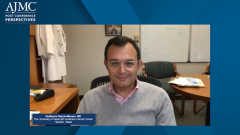
TP53 Mutation and Its Impact on Patient Outcomes in MDS
Dr Garcia-Manero discusses the effects of TP53 mutation in patients with MDS.
Guillermo Garcia-Manero, MD: TP53is one of the most important genes in oncogenesis. It probably has both tumor-suppressive and oncogenic properties, and is an important master regulator of multiple functions in cancer. It is one of the most commonly muted genes, not only in leukemia. but also in many other tumors. It basically protects the cell against insult, in this case chemotherapy. It is also frequently associated with a high level of complexity in terms of chromosomal abnormalities. The majority of patients with the TP53 mutation also have what we refer to, as a high complexity karyotyping that is associated with very poor outcomes. Why does this happen? We don’t really understand. It’s actually less understood in liquid malignancies as opposed to solid tumors, where people discovered this gene several decades ago. But it’s becoming one of the key problems we have. For instance, we know that patients with TP53 mutations don’t respond as well to BCL2 inhibitors such as venetoclax. This is becoming very relevant in acute myelogenous leukemia as well.
I don’t have an answer to your question. We don’t understand why this has become so refractory to therapies. It’s like this gene when mutated establishes a system to protect these cells from the attack of chemotherapy. There’s a proposal that perhaps some forms of immunotherapy may be more active, but the reality is that anytime we look at this, survival is significantly shorter. What was interesting, going back to the presentation, is that the survival here appears to be a bit longer than expected. And the question is why is that the case?
In the first couple of cycles, the PK/PD [pharmacokinetic/pharmacodynamic] profiles were identical. It’s very difficult to say why. Maybe this is an effect of moving forward with more subsequent cycles of therapy. Maybe with it being an oral drug we were more able to be on time with the schedule of therapy. Maybe there was more compliance with it. I think they need to go back and analyze these data in quite a bit of detail, and perhaps do subsequent studies, because these kinds of data have implications for some of the big phase 3 studies that we are conducting, where we may not fully understand the natural history of this disease.
I think this study means that perhaps people will not hesitate to use this drug as a backbone to whatever doublet [therapy]. It’s clear that probably we need to think about combination strategies to improve the outcomes of these patients. With these data, you think this drug could then be a good partner for some other drug where we think there is a potential benefit for this TP53-mutated subset of patients. I think that is pretty clear. If I were going to design a new clinical trial for TP53-mutated MDS [myelodysplastic syndrome], maybe I would like to use this as the backbone in the combination.
Transcript edited for clarity.
Newsletter
Stay ahead of policy, cost, and value—subscribe to AJMC for expert insights at the intersection of clinical care and health economics.










